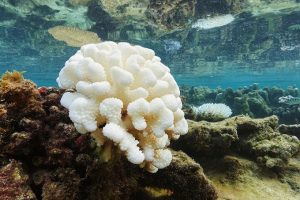Scientists tackling crisis of coral bleaching
by University of Buffalo
12/2/2020
An international consortium of scientists has created the first-ever common framework for increasing comparability of research findings on coral bleaching.

A piece of bleached coral. Coral can survive a bleaching event, but being bleached puts corals at higher risk for disease and death. Photo courtesy of the University of Buffalo.
“Globally, coral reefs are threatened by increasing temperatures, leading to coral bleaching and often death,” says Mary Alice Coffroth, research professor of geology in the UB College of Arts and Scientists, and a co-author of a paper on guidelines published online on Nov. 21 in the journal Ecological Applications.
Andréa Grottoli, a professor of earth sciences at The Ohio State University, was lead author.
Coral bleaching is a significant problem for the world’s ocean ecosystems: When coral becomes bleached, it loses the algae that live inside it, turning it white. Coral can survive a bleaching event, but being bleached puts corals at higher risk for disease and death. And that can be very damaging: Coral protects coastlines from erosion, offers a boost to tourism in coastal regions, and is an essential habitat to more than 25% of the world’s marine species.
Read more here: http://www.buffalo.edu/ubnow/stories/2020/12/coffroth-coral-bleaching.html
Read the Ecological Applications paper: https://esajournals.onlinelibrary.wiley.com/doi/10.1002/eap.2262